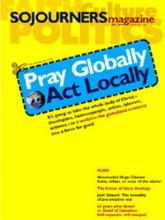Many Christians are convinced that all warfare is antithetical to the gospel, and that being a disciple of Jesus means rejecting violence. Others assert that some war is justified, and the church has established principles by which to discern whether or not a particular war can be considered just. Modern weaponry and tactics have called into question some of the basic assumptions about the just war theory, and have even moved some in the church to reject the possibility of a justified war in today’s world.
In the wake of increased terror attacks and the Bush administration’s war on Iraq, the just war tradition has split between "traditionalists," who consider that the application of just war criteria presumes against war, except in extraordinary circumstances, and those who take the "permissive" approach, who have argued that we live in extraordinary times and thus have "broadened" the criteria for a justified war to include pre-emptive war. George A. Lopez, the author of this article and an advocate of the traditionalist approach, assesses the tensions embedded in this just war debate.
—The Editors
Since the Vietnam era and the introduction of nuclear weapons, debates have been wide ranging about the utility of just war criteria to influence political decisions about the use of force, as well as for making individual moral decisions about which policies to support. In the wake of the 9-11 tragedy, much sharper divisions have emerged among the various positions on the ethics of war.
Read the Full Article

